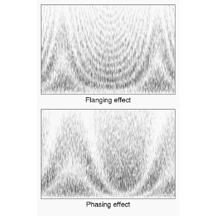Flanging is an audio effect produced by mixing two identical signals together, one signal delayed by a small and gradually changing period, usually smaller than 20 milliseconds. This produces a swept comb filter effect: peaks and notches are produced in the resulting frequency spectrum, related to each other in a linear harmonic series. Varying the time delay causes these to sweep up and down the frequency spectrum. A flanger is an effects unit that creates this effect. (More from Wikipedia)
Another fun effect is running the same or similar musical sections slightly out of synch; it is variously described as phasing and flanging. The latter term was reportedly coined by John Lennon and is still in use today; it refers to sound effects caused by the manual or accidental slowing down of tape in a take-up reel, though the effect can be created electronically as well. The Wikipedia article on flanging describes it this way: “As an audio effect, a listener hears a ‘drainpipe’ or ‘swoosh’ or ‘jet plane’ sweeping effect as shifting sum-and-difference harmonics are created analogous to use of a variable notch filter.” One of the earliest uses of phasing in rock music is the 1967 hit song by Small Faces, “Itchycoo Park”.
* * *
One of my favorite Beatles songs, “Tomorrow Never Knows” is the first of their songs to use flanging; though by the time of its release in August 1966, Wikipedia reports that almost every song on their album Revolver had been subjected to flanging.
Anthology 2 includes the first take of “Tomorrow Never Knows”, and the liner notes give the history of this groundbreaking recording (although it is the final track on Revolver, it is actually the first song that the band worked on after taking off the first three months of 1966): “Clearly refreshed, and full of yet more innovative ideas, they conveyed at EMI Studios on 6 April [1966] and began work on their seventh album, Revolver, with what turned out to be the closing and most progressive number, ‘Tomorrow Never Knows’. Here was Beatles music the like of which had never before been heard . . . or made. Here was a dramatic new direction for a musical form that was ceasing to be ‘pop’ and developing into ‘rock’. Here was a thrilling orgy of sound, all the more inventive for being made within the confines of 1966 four-track technology, less reliant on melody but focusing more on the conveyance of mind-pictures on to tape. ‘Tomorrow Never Knows’ is all of this in a single piece of music, the released version (Take 3) being as stunning now as it was 30 years ago. Recording under its working title, ‘Mark I’, Take 1, issued here for the first time, is notably different but, in its own way, just as compelling. The Beatles’ music had indeed come a long way in the four years since ‘Love Me Do’.”
(July 2015)















